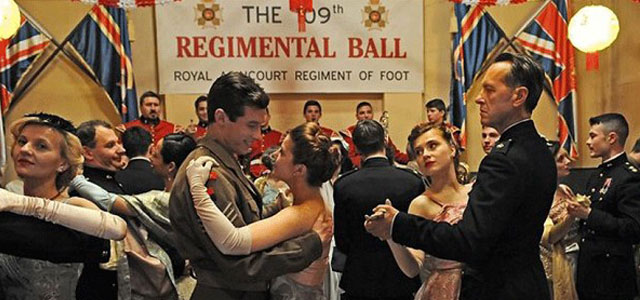
IFTA FIRST LOOK SCREENING - QUEEN AND COUNTRY & JOHN BOORMAN DISCUSSION
- Date: Tuesday September 2nd
- Venue: The Light House Cinema, Dublin
- Time: 6.00pm
- Gallery from the Evening
Irish Film & Television Academy Members were invited to the IFTA First Look Screening of Queen and Country, on Tuesday September 2nd in The Light House Cinema at 6.30pm followed by an interview with writer-director John Boorman.
The Irish Film & Television Academy hosted An evening with legendary filmmaker John Boorman in Dublin on Tuesday September 2nd which was attended by the director's fellow Academy Members, industry colleagues and special guests. Boorman, who has spent almost half his life in Ireland and is considered an adopted son by the country's film industry, has made over 20 feature films over the course of his fifty year long career, including acclaimed classics such as Point Blank, Deliverance, Zardoz, The General, Hope and Glory, Excalibur and The Tailor of Panama. The five-time Academy Award nominated director is also an IFTA Lifetime Achievement Award recipient, in addition to the BAFTA Fellowship he was given in 2004. The 81-year old introduced his new film Queen & Country, before an interview with film critic Tara Brady (The Irish Times) where he discussed the autobiographical elements of the film, the follow-up to the director's Oscar nominated 1987 title Hope and Glory, and gave interesting insights into some of his experiences over the years.
Amongst the guests who enjoyed the screening and discussion were the British Ambassador to Ireland Dominick Chilcott, director Jim Sheridan, author John Banville, actors Sean McGinley and Niall Toíbin, Cathy Belton, Bronagh Gallagher, musician Paddy Moloney (The Chieftains) and more.
Queen and Country was chosen as part of the prestigious Director's Fortnight at the Cannes Film Festival earlier this year with Variety calling it a "vivid snapshot of Army and family life in post-war England" Set in 1952, the film stars Caleb Landry Jones as an 18-year-old British man who joins the National Service and meets an amoral prankster who becomes his friend. They are assigned as instructors in a training camp while others are shipped out to fight in the Korean War. The film also features performances from Pat Shortt, Sinead Cusack, Callum Turner, Brian F. O'Byrne, David Thewlis and Richard E. Grant. The film is set 10 years after Hope and Glory and centres on the same characters. On the selection for Cannes this year in the Director's Fortnight Boorman said the experience was "lovely, much less pressure, much cosier", and joked "I've been going to the festival many times since 1970 so I've done just about everything in Cannes there is possible to do, whether that be In Competition or Out of Competition. I've been part of the Jury where my task was mainly to wake Gerard Depardieu who kept falling asleep and snoring during the screenings!".
Discussing why he decided to revisit the characters first explored in Hope and Glory, Boorman expressed that "I never really got around to it, but coming to the end of my career I decided I better do it now or never. Hope and Glory was made from the point of view of a child and I tried to see it through a child's eyes as I remembered it. In this film of course the boy has grown up a little bit so it's a little more serious".
Remarking on the seismic changes in the industry which he has experienced over the course of his fifty year career the director said "Half a century is about half the life of film itself, film is only around a 100 years or so and I've been making films for about half of it, and what I can say, the one thing that is absolutely consistent is that film has always been in crisis. I was very fortunate because I started making films in the late sixties and seventies when the crisis then was television making a big dent on American studios and they didn't really know what to make anymore, so they kind of thought perhaps these young directors know something about the audience and they allowed us to make films pretty much the way we wanted to".
Commenting on the widening gulf between the liberating environment of that time and making films today, the director expressed, "That was quickly squashed when studios became conglomerates and films became run by committee really, when I stopped making films for the studios was because it became oppressive that you would get pages & pages of notes on the script and you wouldn't get green light until you had satisfied them. Whereas in earlier times you had a kind of middle ground, you could make films with a medium budget and that's completely gone, you either make a studio picture for €100 million or you are condemned to the art ghetto and the gap between the two is enormous, so you have this great disconnect where that middle ground has disappeared which I think is a great shame. It is extraordinary how films continue to get made and yet every year there are still a few that are very good, and that's what I find encouraging - may it continue that way".
Asked about his thoughts on contemporary filmmakers in today's industry, Boorman affirmed that "I think young directors trying to make films today, it's even harder than it was and the problem is with the first film, if you make a first film and it doesn't work and is not successful it's almost impossible to make another one. I had the good fortune at the BBC to make endless film, I shot so much film, directed and edited it and I learnt the craft. It's very hard for young filmmakers to learn their craft today and especially I find the film schools, from time to time when I teach, there is a kind of deliberate ignorance from the film students, that they have no interest in the history of film. When I was 17, the National Film Theatre in London opened and it showed all the great silent films and I lived in there and I was so hungry for knowledge of the past. And I learnt so much from those films by people like DW Griffiths, about economy and about how to express things in scenes without the use of dialogue."
Asked about his announcement that Queen and Country would be his last film, Boorman commented "I do have a couple of scripts that I've always wanted to make and haven't been able to so if the right conditions occurred I might be tempted back".
Finally, the great filmmaker recounted a moment which proved a touching footnote to the evening's discussion, saying "David Lean, before he died, unfortunately as he was trying to make Nostromo he got cancer and the last time I saw him he said to me "Aren't we lucky John, they let us make movies?" and I said "Well they did everything they could to stop us, didn't they?", and he said "Yes, but we fought them!".
- Date: Tuesday September 2nd
- Venue: The Light House Cinema, Dublin
- Time: 6.00pm
- Gallery from the Evening



logomenu.png)